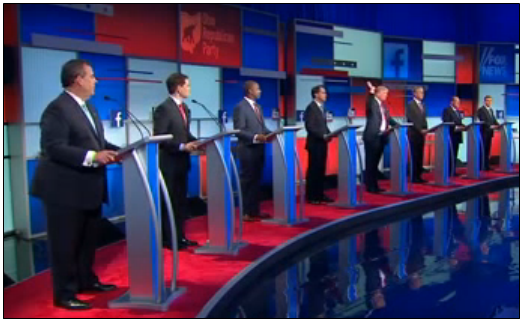“I doubt I’d support Donald. I doubt I’d support the Democrat. I think I’d support getting someone good on the ballot as a third party candidate.”
That was Weekly Standard editor Bill Kristol in an email to CNN Money, threatening to vote for a third party candidate should Donald Trump receive the Republican nomination for president in 2016.
This, even after Trump had signed a loyalty pledge with the GOP, promising to support whoever the nominee was, even if it was not him.
For Kristol, this represents a fairly significant change of attitude.
In July, Kristol defended Trump’s presence in the Republicans race, telling ABC News, “[H]e’s not hurting the GOP, and is probably helping by broadening the tent. Incidentally, if you look at match-ups of the various GOP possibilities with Hillary Clinton, they’re doing no worse today than before Trump emerged. So what evidence is there — as opposed to knee-jerk conventional wisdom — that he’s hurting the GOP?”
One wonders what might have changed since then, yet, by the same metric, today, Republican candidates seem to be doing much better in head to head match-ups against Hillary Clinton, Bernie Sanders, etc. than they were even a month ago.
In the Sept. 4-8 CNN/ORC poll, Trump is tied with Clinton at 48 percent among registered voters. In the same poll, in June, Trump was trailing by 24 points. Republican hopefuls Ben Carson and Jeb Bush lead Clinton slightly in the same poll after trailing, too.
So, as Kristol asked, what evidence is there that Trump is hurting the GOP?
If anything, as Kristol noted in July, Trump may be helping by bringing new people into the process. The August 6 Fox News debate, with 24 million viewers, was the most highly-rated presidential primary debate in history. Last night’s CNN debate drew almost 20 million viewers.
Something that should be music to the GOP’s ears, particularly since Republican Party identification has collapsed in the past decade, research from Gallup reveals. Self-identified Republicans have dropped from a high of 39 percent in September 2004 to just 27 percent today. In the meantime, that decline directly coincided to the uptrend in independents, from 28 percent to 41 percent today.
And Republican turnout in presidential elections has been down, too. Turnout for the Republican presidential candidate peaked in 2004, with 62 million votes for George W. Bush. That was down to 59 million votes for John McCain in 2008, and to 60.9 million votes for Mitt Romney in 2012.
In the meantime, Barack Obama grew the Democrat Party to as high as 69 million votes in 2008, although that total was down to 65.9 million votes in 2012.
Still, the point stands. The Republican Party has not grown at all in the past 11 years.
To do well in 2016, Republicans will clearly need to grow the party by several million people in order to be competitive once again, let alone to win the White House.
So, if Trump accomplishes that, whether or not he wins the nomination, by bringing new voters into the party’s primary process, that makes him a builder, not a destroyer.
Still, Trump originally defined his reluctance to rule out an independent run for president at the August 6 debate as “leverage” to be used if he was not treated fairly by the party. On the Hannity Show after that debate, he said, “If they don’t treat me well, Sean, why should I make that pledge? At this moment, it’s great leverage, and I might as well use it.”
Trump added, “I just want to be treated well and treated with respect.”
Perhaps Trump should not have made the loyalty pledge after all, as it is not at all clear the Republican establishment per Kristol is willing to make the same pledge to support Trump should he be granted the party’s nomination. And if they want somebody else to be the nominee, they have a very simple solution: Beat him.
Robert Romano is the senior editor of Americans for Limited Government.







